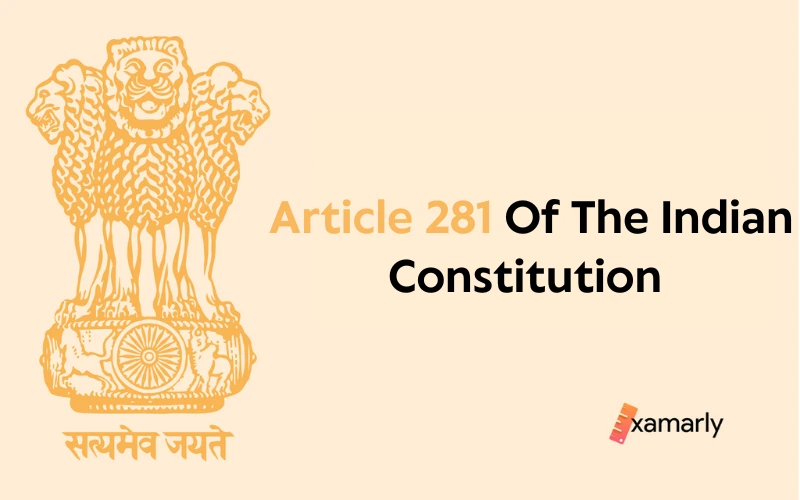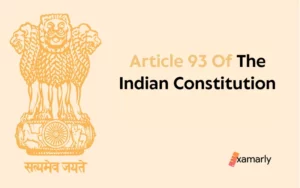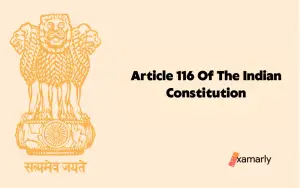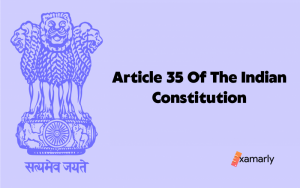An Overview
Are you an UPSC aspirant who is on a lookout for understanding Article 281 of the Indian Constitution? Have you ever wondered what is the Finance Commission of our country?
Then, fret no more. This is the right stop for you.
Article 281 of the Indian Constitution deals with the powers and functions of the Finance Commission, which is a constitutional body responsible for making recommendations to the President of India.
This blog on Article 281 of the Indian Constitution gives a detailed explanation of the said article. It discusses the provisions contained in the article and also its background. Gain an in-depth knowledge of Article 281 and ace your exam preparation.
- An Overview
- Article 281 Of The Indian Constitution: Provision Related To The Suggestions Made By The Finance Commission
- Background Of Article 281 Of The Indian Constitution
- Explanation Of Article 281 Of The Indian Constitution
- Summing Up
- FAQs Related To Article 281 Of The Indian Constitution
- Does Article 281 Of The Indian Constitution Has Any Clauses Or Sub-clauses?
- Which Government Official Has The Authority To Lay Down The Suggestions Made By The Finance Commission In The Houses Of The Parliament?
- Which Other Article Of The Indian Constitution Contains Provisions Related To The Finance Commission Of India?
- What Was The Purpose Behind The Establishment Of The Finance Commission Of India?
- Who Are The Members That Make Up The Finance Commission Of India?
- What Is The Purpose Of Article 281 Of The Indian Constitution?
- Who Appoints The Members Of The Finance Commission?
- How Often Must The Finance Commission Submit Its Recommendations To The President?
Article 281 Of The Indian Constitution: Provision Related To The Suggestions Made By The Finance Commission
Article 281 of the Indian Constitution talks about the provisions which discusses the procedure for introducing the recommendations that are made by the Finance Commission in the Houses of the Parliament.
The Finance Commission plays a crucial role in ensuring the financial stability and viability of the country’s federal structure, and its recommendations have a significant impact on the fiscal policies of the government.The Commission provides its opinion on financial matters related to the distribution of tax revenues between the Union and the States, and among the States themselves.
The following paragraph is included in the Constitution of India as the official text of Article 281 of the Indian Constitution. It has been quoted from the official document of the Constitution of India. It reads as follows:
The President shall cause every recommendation made by the Finance Commission under the provisions of this Constitution together with an explanatory memorandum as to the action taken thereon to be laid before each House of Parliament.
Background Of Article 281 Of The Indian Constitution
- Article 281 of the Indian Constitution was finalised from Draft Article 261. It was introduced in the Constituent Assembly for discussion on August 10, 1949.
- The article stipulated that the President must explain his decision on revenue distribution between the Union and the States. The President must also submit a report to the Parliament with the proposals of the Finance Commission.
- The Drafting Committee Chairman suggested changing the wording of this Draft Article. He opined that the report must be submitted to ‘both Houses of Parliament’ rather than simply ‘Parliament’.
- No objection was raised with regard to this amendment. The Assembly readily approved of this revision.
- An amendment was proposed that would give Parliament the power to make the final decision on the distribution of revenue between the Union and States after the President submits a report.
- This amendment was supported by some members in order to limit the President’s powers and ensure that the concerns of the States are considered by their representatives in the Parliament.
- The proposed amendment included a clause that would allow Parliament to make changes to the President’s report, and the report as ratified by Parliament would become law.
- There were some members who opposed the proposed amendments to Draft Article 261. They argued that the amendments did not give the President any new powers, but rather just established a process for the President to follow in exercising powers granted under other provisions.
- Some members of the Assembly were concerned about the extensive powers that would be accorded on the Finance Commission. The opponents of the amendments pointed out their reason. They argued that the suggestions given by the Finance Commission were not required to be followed by the President.
- These proposals for modifications to Draft Article 261 were rigorously debated and discussed. However, despite a lot of pondering, the Constituent Assembly decided to reject these suggestions.
- The Draft Article, with just the initial revision was eventually made a part of the Constitution of India. It was done on August 10, 1949.
Explanation Of Article 281 Of The Indian Constitution
By looking closely at the text of Article 281, we can say that the article discusses the role of the Finance Commission, which is a body established under the Indian Constitution to make recommendations on financial matters such as the distribution of tax revenues between the Central and State governments.
The President of India is required to present to the Parliament, which is the legislative branch of the government, every suggestion made by the Finance Commission. The Commission’s proposition must also carry with itself an explanation of what actions have been taken in response to the recommendation. In other words, the President must report to Parliament on the recommendations of the Finance Commission and any actions that have been taken based on those recommendations.
To put it in simple words, the President is responsible for ensuring that each and every recommendation made by the Finance Commission in accordance with the stipulations of this Constitution. These recommendations are to be presented to both Houses of the Parliament, that is the Council of States, or the Rajya Sabha and the House of the People, also known as the Lok Sabha. It must also have an explanatory memorandum appended to it regarding the actions taken in response to those recommendations.
You Might Also Like:
| Article 379 Of The Indian Constitution | Article 272 Of The Indian Constitution |
| Article 269 Of The Indian Constitution | Article 268 Of The Indian Constitution |
Summing Up
By analysing the provision of Article 281 of the Indian Constitution, we can come to the following conclusions.
- The President of India is responsible for presenting the suggestions of the Finance Commission to the Parliament. The President must also provide an explanation of any actions taken in response to those recommendations.
- The recommendations must be presented to both Houses of Parliament, the Council of States or the Rajya Sabha and the House of People, or the Lok Sabha.
- This must include an explanatory memorandum detailing the actions taken.
- The President is required to fulfil this responsibility in accordance with the provisions of the Constitution.
FAQs Related To Article 281 Of The Indian Constitution
Does Article 281 Of The Indian Constitution Has Any Clauses Or Sub-clauses?
No, Article 281 of the Indian Constitution does not include any clauses or sub-clauses in its text.
Which Government Official Has The Authority To Lay Down The Suggestions Made By The Finance Commission In The Houses Of The Parliament?
As per the provisions held in Article 281 of the Indian Constitution, it is the responsibility of the President of India to put before the Houses of the Parliament, that is, the Council of States (Rajya Sabha) and the House of the People (Lok Sabha) all the suggestions that have been made by the Finance Commission.
Which Other Article Of The Indian Constitution Contains Provisions Related To The Finance Commission Of India?
Article 280 of the Indian Constitution is one such article. It deals with provisions concerned with the Finance Commission of India.
What Was The Purpose Behind The Establishment Of The Finance Commission Of India?
The Finance Commission of India is a constitutional body of the Indian government. It was established with the aim of enabling the agency with the responsibility of allotting revenue resources to the Union government as well as the State government.
The President of India laid down the foundation of this constitutional body. This was possible because of Article 280 of the Indian Constitution.
Who Are The Members That Make Up The Finance Commission Of India?
The Finance Commission of India is constituted by the Chairman who is the Head of the organisation and presides over it and four other members.
What Is The Purpose Of Article 281 Of The Indian Constitution?
Article 281 of the Indian Constitution establishes the Finance Commission as a body responsible for making recommendations on financial matters related to the distribution of funds related to taxes between the Central and State governments.
Who Appoints The Members Of The Finance Commission?
The President of India appoints the members of the Finance Commission. The President may do so in consultation with the Governor of each state.
How Often Must The Finance Commission Submit Its Recommendations To The President?
The Finance Commission must submit its recommendations to the President every five years. It may also do so at such other intervals as the President may direct.






